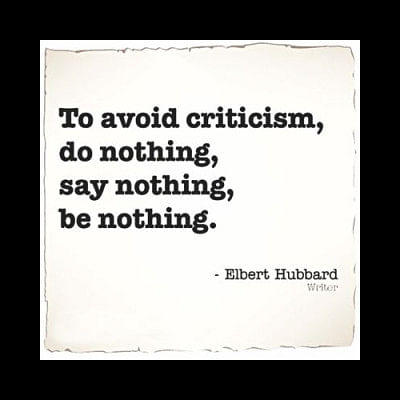How to stomach criticism of your writing

If you write, you will know the process of converting a random jumble of sentences into something cohesive and meaningful is extremely liberating. However, all too often other people will read your supposed masterpiece and tear it apart like the wrapping on wedding gifts. The following are some ways you can make the most of criticism.
You're not perfect: As flawless as your writing may appear at a cursory glance, closer inspection by a proof-reader will reveal that there are a host of problems with it. The only reason you think otherwise is because you wrote it. No parent wants to hear bad things about their kids, and no writer wants to hear bad things about their work. Even if their kid happens to be mugging people in Mohammadpur at night, parents will claim fake news and turn a blind eye to those indiscretions.
This is why you need to remind yourself that nothing is perfect, not even the fiction piece you've poured your heart and weeks into. There may be some plot points that sounded better in your head than on paper. You might also have forgotten to fill the reader in on some essential information, which is why they say your story has plot-holes. The sooner you realise that your work is imperfect, the better chances you have of improving your stories.
Change is okay: You may not be the biggest fan of change, but sometimes it is necessary. This goes for all aspects of your life, but is especially true when it comes to writing. In fiction, especially, people have a hard time letting go of things they've written. This attachment isn't doing a favour to you or your story.
I used to think the characters in stories would take offence if I changed their dialogues or actions. Eventually I realised (I think) that it makes more sense for my fictional characters to behave how I make them, and that there should be a limit to how far you take their personification. If someone says a paragraph isn't advancing the story, take their word for it. Your characters will be grateful for the increased clarity, as this ensures the focus falls squarely on their story.
Don't get angry at those trying to help: No one likes to be chastised, but sometimes there's nothing else to be said. In most cases, harsh criticism is delivered when people have higher expectations of you. Thus, instead of questioning people's judgement and calling them names, try to turn this criticism into something constructive. At least they cared enough to point out the mistakes, unlike those people who skimmed through and said “Good work, so proud of you!”
Criticism isn't fun, but it is important. Without it, you would be stuck in an endless cycle of mediocrity, never improving. Instead of balking in the face of criticism, take a deep breath, cry into a pillow, and get back to writing. You owe it to yourself to get better, and to do justice to the lofty expectations your friends and well-wishers have of you. Happy writing, everybody!
With a heart of ash and a PC of potato, Wasique Hasan could use some help. Send him memes to cheer him up at facebook.com/hasique.wasan

 For all latest news, follow The Daily Star's Google News channel.
For all latest news, follow The Daily Star's Google News channel. 



Comments